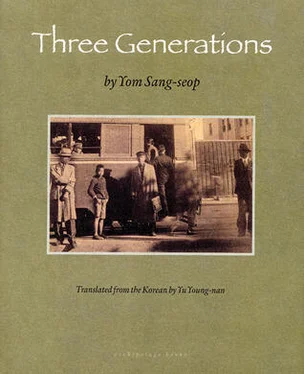From the outset, Gyeong-ae’s mother said nothing to her daughter about the affair. Nor did she say anything when she was reunited with her after the three-month interval. Was she resigned to it all, since nothing was to be gained by making a fuss? Was she willing to repay Sang-hun’s kindness to her husband with her own daughter’s body? Or was she making a secret calculation? Since Sang-hun had such a reputation — not that anybody really cared about that — and such wealth, when she died, even if she wasn’t carried in a six-bar hearse by twelve men, she would be spared the shame of riding to her grave in a coffin with only two pallbearers. This calculation might indeed have been foremost in her mind.
This was a woman who had been an evangelist, carrying her Bible around with her in a black tote bag. But she was not a naïve woman who had forgotten what to do to ensure her own survival. Besides, she was a third wife, just a step above a concubine. If she hadn’t believed in Jesus and hadn’t married a man who had devoted his life to social causes, she herself might have ended up pouring wine for men in the marketplace or making a gisaeng out of her daughter. This is not to demean her, but rather to suggest that she was open-minded and resourceful, and that individual circumstances affect the choices people make. If her husband had left behind paddies yielding forty or fifty bags of rice a year, she would never have been indebted to Jo Sang-hun, and she would never have come to Seoul in the first place.
As it turned out, this woman became a grandmother three months after she moved into her new house. A new life had been received, shielded from the eyes of the world. But it was this infant who forced her grandmother to turn her back on the church.

“Whatever the reason — whether my father has become demented or he’s thinking of the old days — shouldn’t you discourage him from doing it?” Sang-hun said to Chang-hun, his cousin once removed.
“How can I possibly convince him, when even you can’t? We’re in the same boat. You can’t stop him, and I can’t get him to listen to me.”
“Tell me, then — who’s putting these ideas into his head in the first place?” Sang-hun retorted.
“You don’t know what you’re talking about. Does Uncle ever listen to anyone? You seem to think I have something up my sleeve. Well, I don’t.”
“Then explain to me his sudden extravagance at a difficult time like this. Why renovate the grave site of an ancestor who goes back ten generations, if not more?” Sang-hun had no idea whose grave it was.
“Don’t you think you should ask your father, not me?” growled Chang-hun, turning purple in the face.
Because the ancestral ceremony was taking place that day, all the relatives had gathered at the house. One of the rooms in the outer quarters was almost bursting at the seams, and the air was thick with cigarette smoke. Sang-hun didn’t participate in the rites, but he always sat in the outer quarters and left immediately after the final ritual, when the officiator imbibed and nibbled from the offerings on the table.
Sang-hun’s father was busy in the inner quarters supervising, while the elderly and middle-aged relatives occupied the large room in the outer quarters, waiting for the food and chatting loudly among themselves. When Deok-gi returned home a little after eight, he received a good deal of scolding from his grandfather for gallivanting on the sacred day, and to make it up to him he was now helping to arrange the food on the ceremonial table in the inner quarters. The old man made sure that his grandson learned the proper procedures, such as placing fish to the east and meat to the west, and the strict rules of fruit placement: first jujubes, then chestnuts, pears, and finally persimmons arranged in order from left to right. The old man knew his son wouldn’t perform the rites after he died, so he was relying on Deok-gi, his only grandson and the eldest of his generation, to carry on the family name.
The old man had already made sure that his last words would outlive him. If any bastard dared to offer up a Christian prayer for him after his death, he’d retrace his steps from the underworld and rip out the rogue’s tongue with his own hands. He was terribly worried that his son would give him a Christian funeral, and in order to avoid such a horror, he had made it clear that all ceremonial procedures were to be supervised by Secretary Ji with the counsel of Chang-hun, who at the moment was arguing with Sang-hun in the smaller room of the outer quarters. The old man had told his son that when the time came he was free to do as he pleased — follow the procession in a tuxedo, ride in a carriage or an automobile, or else he could just lounge around in a gisaeng house, humming a tune.
The old man wanted to live another fifteen years, by which time he would be eighty-two and have a son with the Suwon woman. He fantasized that if she became pregnant now, by the time he died he would have a fifteen-year-old chief mourner to follow the procession on a pitched-roof palanquin. The old man’s worries were mostly centered around this wish. If he were to find a woman who could guarantee that she’d give birth to a son, he’d happily take her in, though he didn’t dare breathe a word about such dreams. Each day, Secretary Ji concocted medicines that would help prolong the old man’s life for another decade or more and help him sire a son. On winter days, Ji thought his feet might fall off from spending so much time preparing these cures before the medicine chest in the freezing hallway.
But if the old man actually lived as long as he hoped to, the designated funeral master might well die before him, as he was getting up there in age, too. The same was true for Chang-hun for that matter; he was over fifty.
“Wasn’t it you, Cousin, who moved the clan’s temporary genealogy office here?” Sang-hun again accused his cousin.
“What are you talking about? The head of the clan decides these things. I just run errands on the old man’s behalf. You nag me whenever you see me, but what have I done?” Chang-hun had recovered his composure and answered with patience.
“Your cousin is right,” cut in another young cousin sitting nearby. “Where else could we have opened the office anyway?”
“How much money did you spend on the genealogy office?” Sang-hun figured his father must have squandered at least three or four thousand won in printing genealogy books alone.
“I don’t know. Look, it’s all been recorded in the account book. Someone else handles the expenses,” Chang-hun answered icily, snorting before he added, “Do you think I went out and bought a pack of cigarettes or a bowl of rice with the money? I didn’t do anything of the sort! I was born into the Jo family, and I’m obliged to do this, whether I like it or not.”
Sang-hun refrained from pressing his cousin any further, but his thoughts were sharp: I see you’ve replaced the Korean rubber slippers you wore when you first came to Seoul with Western shoes. Your shabby outer coat has transformed itself into a stylish wool serge, and, to top it off, you’re now wearing a Western overcoat. Just where did all this come from?
“When will you take down the genealogy office signboard?” asked Sang-hun sarcastically, after a long pause.
“Now that the printing is done, it’ll be taken down even if people object,” Chang-hun answered.
“So, now that you’re out of work, you can’t pay for your meals at the inn. That’s why you came up with a new project, right?”
No one in the room answered.
It had been some time since the long, wide signboard bearing the words “_____ Jo’s Genealogy Office” had been posted on the gate with the magnificent rising roof at Adviser Jo’s house in Suha-dong. Two years had passed and not a single member of this particular branch of the Jo clan had failed to stop by. Those who up till now had been complete strangers flooded into the office. Sang-hun disapproved of these irritating clansmen. But the grandfather allowed these young country bumpkins, who imposed themselves on him in droves and called him “Grandfather” or “Uncle,” to stay at his house for days on end. When they left, he would even send them packing with travel money.
Читать дальше













